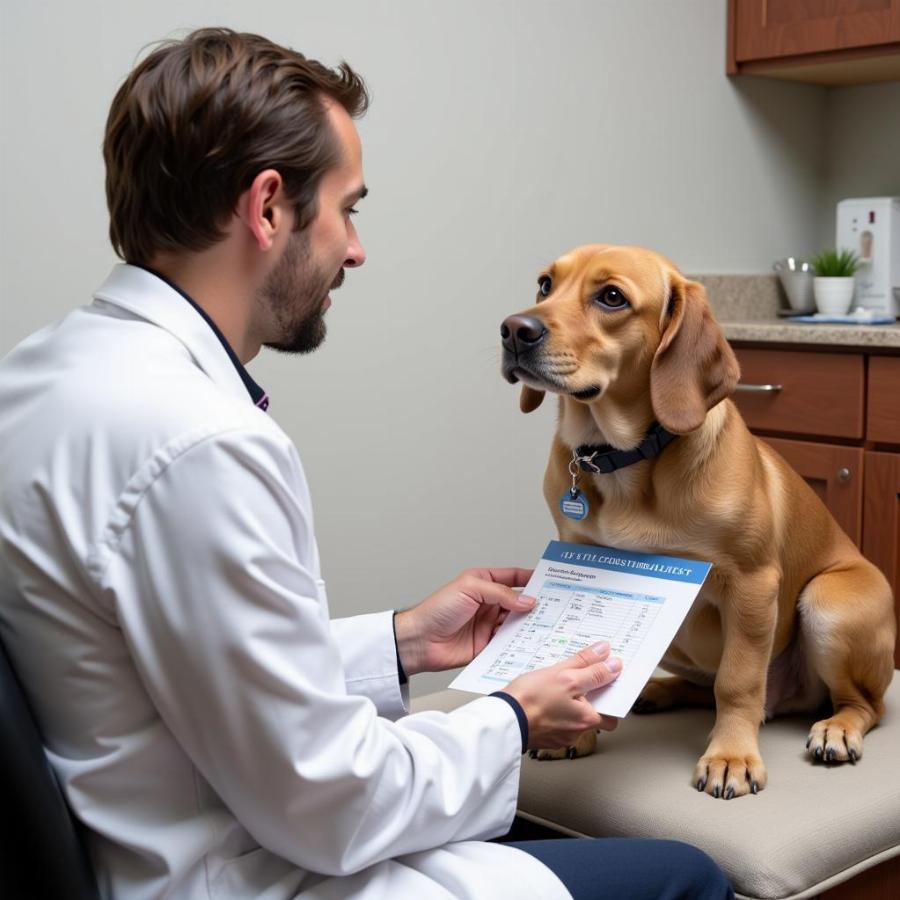The ACTH stimulation test, also known as the cosyntropin stimulation test, is a valuable tool used by veterinarians to diagnose certain hormonal imbalances in dogs. If your veterinarian has recommended this test for your furry friend, you likely have questions about what it entails and what the results could mean. This article aims to provide a clear and comprehensive overview of the ACTH stimulation test in dogs.
What is the ACTH Stimulation Test?
This test is specifically designed to assess the function of the adrenal glands, two small but mighty organs located near the kidneys. These glands are responsible for producing several essential hormones, including cortisol, often referred to as the “stress hormone.” Cortisol plays a vital role in regulating metabolism, managing stress responses, and controlling inflammation.
The ACTH stimulation test measures how well the adrenal glands respond to adrenocorticotropic hormone (ACTH). ACTH, produced in the pituitary gland located at the base of the brain, acts as a messenger, signaling the adrenal glands to produce and release cortisol.
Why is the ACTH Stimulation Test Performed?
Veterinarians utilize the ACTH stimulation test to diagnose or rule out two primary conditions that affect the adrenal glands:
1. Cushing’s Disease (Hyperadrenocorticism): This condition occurs when the adrenal glands produce excessive cortisol.
2. Addison’s Disease (Hypoadrenocorticism): Conversely, Addison’s disease arises when the adrenal glands fail to produce sufficient cortisol.
What are the Symptoms of Adrenal Gland Disorders in Dogs?
Recognizing the signs of potential adrenal gland problems in your dog is crucial for seeking timely veterinary care. While both Cushing’s and Addison’s disease can manifest with varying symptoms, some common clinical signs include:
- Increased thirst and urination
- Increased appetite
- Pot-bellied appearance
- Hair loss
- Thin skin
- Lethargy
- Muscle weakness
- Vomiting or diarrhea
If you notice any of these symptoms in your canine companion, it’s essential to schedule an appointment with your veterinarian for a thorough evaluation.
How is the ACTH Stimulation Test Performed?
The ACTH stimulation test is a relatively straightforward procedure that usually involves the following steps:
-
Baseline Blood Draw: A small sample of blood is drawn from your dog to measure their initial cortisol levels.
-
ACTH Injection: A synthetic form of ACTH is injected into your dog, typically in a muscle.
-
Second Blood Draw: After approximately one to two hours, a second blood sample is collected to assess how the adrenal glands responded to the ACTH stimulation.
Interpreting the Results of the ACTH Stimulation Test
Analyzing the cortisol levels in both blood samples allows your veterinarian to evaluate the adrenal glands’ function. Here’s a general interpretation of the results:
-
Normal Response: If the adrenal glands are functioning correctly, the cortisol levels will rise significantly after the ACTH injection.
-
Low Response (Suspect Addison’s Disease): A minimal or absent increase in cortisol levels suggests the adrenal glands are not responding adequately to ACTH, indicating possible Addison’s disease.
-
Exaggerated Response (Suspect Cushing’s Disease): An abnormally high level of cortisol after the ACTH injection could be a sign of Cushing’s disease.
What Happens After the ACTH Stimulation Test?
Based on the test results, your veterinarian will discuss the diagnosis and recommend appropriate treatment options for your dog.
“It’s important to remember that the ACTH stimulation test is just one piece of the diagnostic puzzle when evaluating adrenal gland function,” says Dr. Emily Parker, a board-certified veterinary endocrinologist. “Other tests, such as urine analysis and imaging, might be necessary to confirm the diagnosis and determine the best course of treatment.”
 Veterinarian Explaining ACTH Stimulation Test Results to Dog Owner
Veterinarian Explaining ACTH Stimulation Test Results to Dog Owner
ACTH Stimulation Test: A Valuable Diagnostic Aid
The ACTH stimulation test serves as a crucial diagnostic tool, enabling veterinarians to accurately diagnose and manage adrenal gland disorders in dogs. By understanding the purpose, procedure, and potential outcomes of this test, you can be a more informed advocate for your beloved canine companion’s health. Early detection and appropriate management of adrenal gland conditions can significantly improve your dog’s quality of life.
Frequently Asked Questions about the ACTH Stimulation Test in Dogs
1. Is the ACTH stimulation test painful for dogs?
The ACTH stimulation test involves two blood draws, which some dogs may find mildly uncomfortable. The ACTH injection itself is similar to a routine vaccination.
2. Are there any risks associated with the ACTH stimulation test?
The ACTH stimulation test is generally considered safe for dogs. However, as with any medical procedure, there are always minimal risks, such as allergic reactions to the medications used.
3. How long does it take to get the results of the ACTH stimulation test?
The results of the ACTH stimulation test are usually available within a few days.
4. How much does the ACTH stimulation test cost?
The cost of the ACTH stimulation test can vary depending on your location and your veterinarian’s fees. It’s always best to discuss the cost with your veterinarian beforehand.
5. Are there any alternative tests to diagnose adrenal gland disorders in dogs?
Yes, there are other tests available, such as the low-dose dexamethasone suppression test (LDDS), to diagnose adrenal gland disorders. Your veterinarian will determine the most appropriate test based on your dog’s specific circumstances.
Need More Information?
For additional guidance and support regarding your dog’s health, we encourage you to explore other informative articles on our website or reach out to our team of experts at Beaut Dogs. We are dedicated to providing you with reliable and comprehensive information to help you make the best decisions for your furry friend’s well-being.
Beaut Dogs is your trusted source for all things dog-related. We provide valuable insights, expert advice, and a supportive community to guide you on your journey as a dog owner.
When you need assistance, don’t hesitate to contact us at [email protected] for detailed and accurate answers from Beaut Dogs.